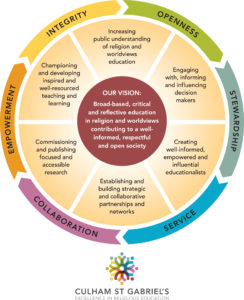Working in a Church of England High School affords me the luxury of RE being a core subject and is therefore held with high esteem. SLT, governors, students and parents see the value in what we do and what we are trying to achieve with our young people. GCSE is compulsory and our results are slightly above national average. Everything was going swimmingly…………. until the 18th March 2020 when the announcement was made that schools would be closing their doors to the majority of students. From the following Monday we would enter an unknown world of virtual teaching. But that’s fine! We can all use computers, can’t we? We can all carry on with our schemes of work and tweak them for home learning, can’t we? My expectations were high. I know my students and I know what they are capable of. The work was set and the days until ‘hand in’ were counting down.
Then came the reality. The students were clearly taking time to adjust to home learning. A different way of learning, reading instructions via an online platform, guiding themselves through carefully constructed resources, downloading attachments that has challenged us, but without their teacher in the same room for reassurance.
I am immensely proud of my students and how hard they work. So, when the work that appeared in my inbox varied in quality, I had to remain reflective and ask questions of myself and my team as to why this might be the case. Well, the usual high standard of work was caught up in the minds of confused, scared and unsettled young people who were trying to find their feet in a world that had been turned upside down!
Laptops on knees, dining room tables, desks in bedrooms, living room side tables. Some working during school hours and others not until they can get a slot on the shared computer at home or after their younger siblings have gone to bed because they have been helping to care for them. The circumstances that our students are working in are so varied and, in some cases, complex. We needed to factor that in.
So, a rapid change in mind set from me and let’s see what happens. Gone are the requirements to complete every section of the PowerPoint that has been set and ‘proof’ being sent to me and welcome to quick wins. The PowerPoint is still shared and a hope that students will find the time to work through it. A differentiated approach works better, with extensions there for the more able and more scaffolded tasks for lower ability groups. Online spelling tests, quizzes and reflections on their current experience are a win. Something changed overnight. Notification after notification!! The work was actually flooding in after all. The online self-marking tasks also hinted to me about who had really engaged with the lesson and who had maybe gone straight for the quiz. But I can now record that and make sure that I cover those areas that seem to have received lower scores when we return to school.
I may have adapted my expectations during home learning but, in doing so, student participation has drastically increased. They are engaging much more readily and are doing more than required of them too. In addition to the spelling test or quiz or whatever is it, they are also sending me pictures of their work that they are proud of………and I’m proud too!
Lockdown is tough, but so are we!
